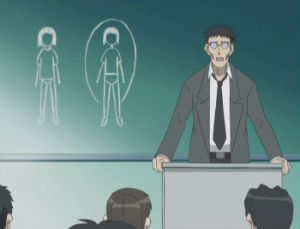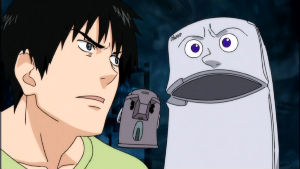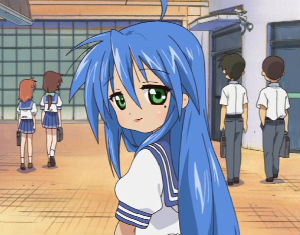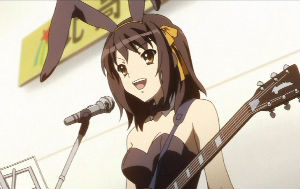

Quick Links:
The Top 5 Otaku Pander Anime of the Decade
The Law of Conservation of Creepy states that everyone who's into anime knows at least one otaku. I'm not talking about the American "Hey, I like anime — I'm an otaku!" type. I'm talking about the full-on, jobless, never bathing, lives in his mom's basement otaku. The level of otaku that will bring shame upon the household. These people tend to be fairly miserable, or pretend to be happy. Japan realizes that this type of fan exists, and therefore makes shows to capitalize on these pathetic souls. These shows can be enjoyed by just about anybody; however, there is a special something, a certain quality that otaku can latch onto, and somehow feel better about themselves. What qualities do I speak of? Well, some offer comfort, others offer, er... "other" feelings that I am not comfortable mentioning.
5) Azumanga Daioh!: Premiere — April 8, 2002
On the surface, Azumanga is a fairly cute, funny slice of life show. The concept is as simple as can be: a bunch of girls attend a high school where the teachers border on psychotic. Classes are attended, Murphy's Law kicks in, and hilarity ensues. There are enough sight gags and jokes to entertain almost any fan.Beneath the cutesy exterior, though, Azumanga latches on to the lonely otaku. Each of the main characters is a representation of the popular archetypes: Chiyo is the token loli, Sakaki is the gorgeous yet shy one, Osaka's the spacey one, and so on. The show provides an outlet for almost any schoolgirl fetish one can think of. In that light, one could see the slack jawed Kimura-sensei as an analogue for the viewer, as he is open about his lust for the girls, going as far as to take up a teaching gig so he can ogle them.
4) Welcome to the NHK!: Premiere — July 9, 2006
Welcome to the NHK could be taken as almost ironic in its treatment of the otaku. The series is beyond brutal in its protrayal of otaku, hikkikomori[1] rather.Tatsuhiro Sato, the main character, is portrayed as a quiet, paranoid individual that suffers from an extreme case of agorophobia. He hates going outside, and fears talking to people in general. He sleeps 16 hours a day, and spends the other 8 whacking off or slowly descending into madness with constant conspiracy theories that his socially-ill mind cooks up. In particular, he thinks that TV network NHK is trying to mass-produce anime otaku by producing anime, which would create a society of unemployed fatties. The "Nihon Hikkikomori Kyokai", in the words of the show.
How does this pander? Simple. Sato's resolve begins to change upon meeting Misaki Nakahara. She claims to be able to cure his hikkikomori ways. The series plays to an otaku's desire to be rescued, to be loved... preferably by a cute girl. The show also touches nerves on addictive personalities, such as when Sato joins an MMO, as well as the otaku's seemingly endless love of porn. The series proves to be beyond dark in its delivery, but there's a strange, almost comforting aspect that is woven into the narrative. The overt sexuality doesn't hurt, either.
[1] A hikkikomori is a shut in — somebody who confines himself to his home, effectively withdrawing from society, due to various social or personal issues.
3) Lucky Star: Premiere — April 8, 2007
Lucky Star is an absolute treat for otaku. The character of Konata alone ensures that there will always be some focus on games, anime, or the like. Jokes about obscure anime like Marimite, and the popular titles like Keroro, Initial D, or Haruhi will have the trivia nerds tickled pink. The Comiket portions should hit a few nerves with anybody who braves the dealers room at large anime cons like Otakon or AX enough to have a frequent-buyer card.The content of the show itself proves to be fairly mundane mostly, as characters talk about things like how to eat a chocolate cornet, or how to make the perfect curry. It's hard to say just what panders to the otaku in such limited space, but it may be that sense of normalcy, the familiarity and acceptance an otaku truly craves. Nobody treats Konata as the outcast, even though she's clearly the black sheep — the anime nerd, the hardcore RPGer and erogamer. Most otaku really can't claim to have friends like that.
In addition, there is a large amount of moé fan service, and tons of allusions to said service, that drives otaku wild in another way. Cosplay, bathing suits, kimono... it's all fair game.
2) Genshiken: Premiere — October 10, 2004
I've said it before, and I'll say it again. Genshiken is one of the best examples of an otaku's mindset. The series is merciless in its description of every huge otaku subculture, from gamers, to anime geeks, to manga fiends and cosplay fanatics. All of them are proud of their obsession, and revel in their discussions over which episode of Kujibiki Unbalance was better, or if Guilty Gear Isuka really is the paragon of all fighting games.
The series constantly justifies the typical otaku behavior, and rationalizes the more questionable segments of the culture, such as rape games, panty fetishes, and irrational character attachment. The rationalizations are tied together with a strong comeraderie between the characters, which hints strongly that, no matter how outcast a person is, there will always be others like them. Be it on the 2ch message boards, or in the depths of Toranoana, there will always be a person out there who is just as bad as, or worse than you.
The major females, while strong characters in their own right, serve the obvious fan service position, with revealing cosplay shots that will fuel doujinshi for many years to come.
1) The Melancholy of Haruhi Suzumiya: Premiere — April 2, 2006
Where to begin?
Haruhi is the birthplace of countless internet memes, from the Mikuru Beam, to nyoro~n and then some. Hare Hare Yukai has become the anthem of the raging otaku, as well as the screeching fangirl, and God Knows is a perfect candidate for "Otaking's preferred music," as it was both incredibly popular (peaked at #5 on Oricon's top sales charts), and it received prominent placement in the anime.Haruhi fits the perfect otaku mindset — disinterested in anything that doesn't fit her narrow definition of "amazing," and brutally rude to anyone around her. Those she finds are around only to suit her needs, and are therefore are disposable in the long run. And, if something bores her? The consequences are simply dire.
Mikuru is the [wet] dream girl of the otaku. She's has a cute face and a great body, and she's submissive to the point of not knowing that she can say "no." As a result, Haruhi dresses the poor girl in every fetish outfit imaginable, from bunny girl to maid, to sexy maid, to... well, you get the picture. She's eye candy that gets molested, fondled, and groped by the aggressive Haruhi at every turn.
Haruhi managed to ingrain itself into otaku culture in a way that's rarely been matched. It pandered to many of the popular interests and fetishes, on top of being a top-notch title that stands well on its own. Such a feat is something to be admired, respected even. For that, Haruhi gets the dubious honor of top otaku pander show of the decade.





